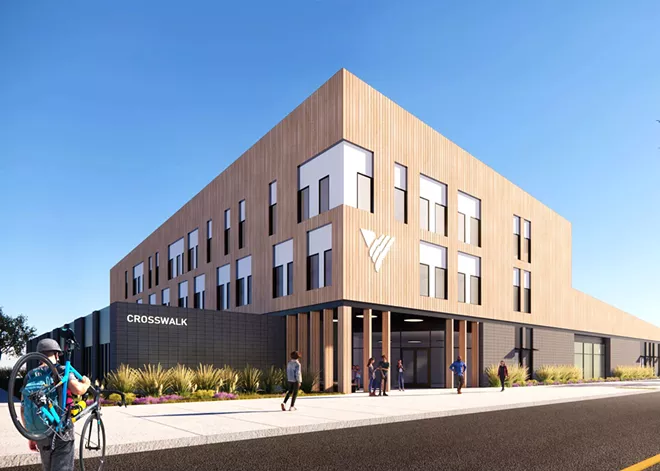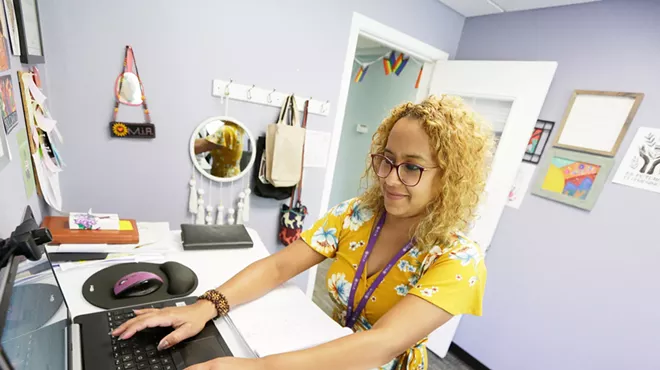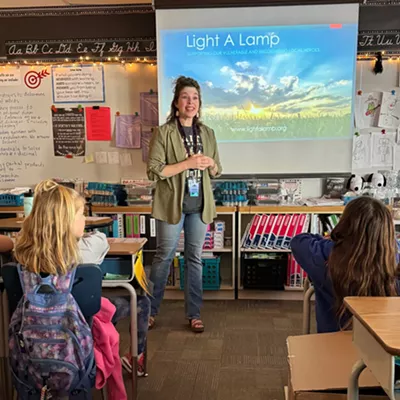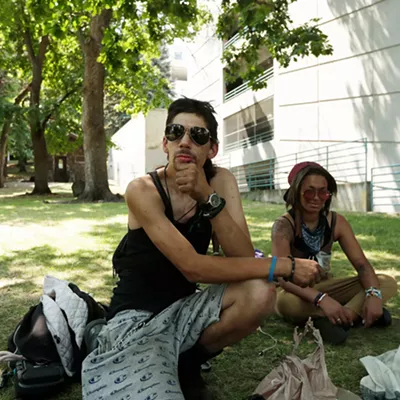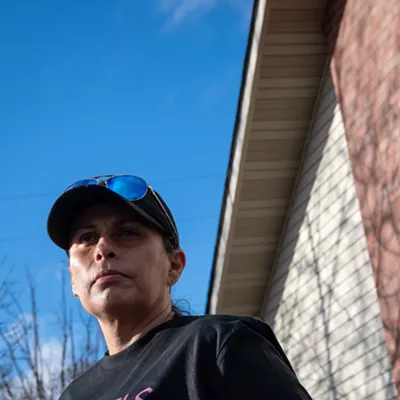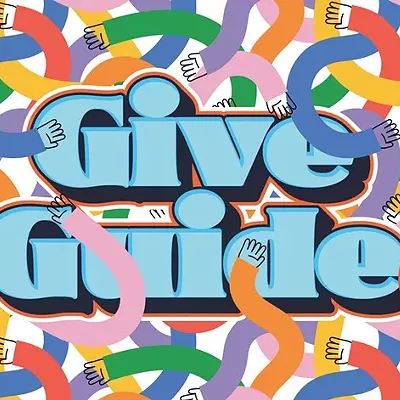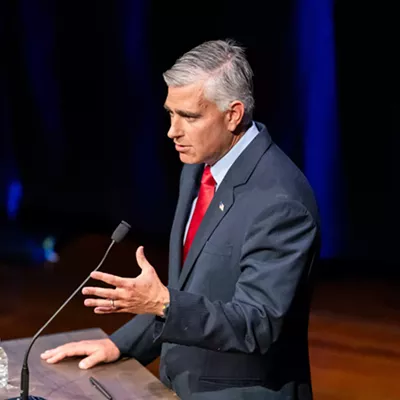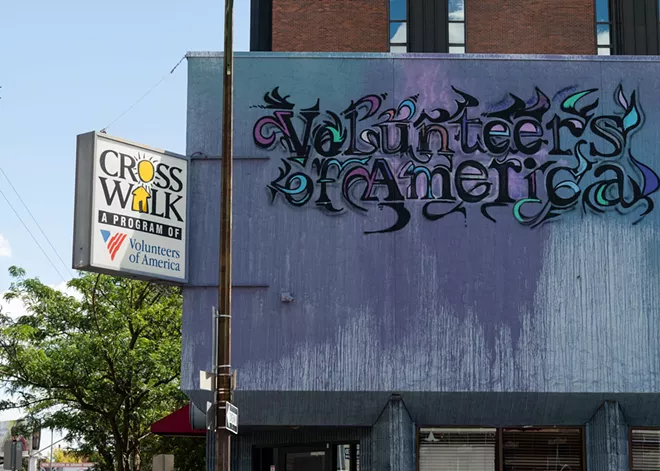
Recently, the mantra around the downtown Volunteers of America offices has been, "Can't wait for Crosswalk 2.0. Can't wait for Crosswalk 2.0," says Bridget Cannon, senior vice president of shelters for VOA.
For nearly 40 years, the nonprofit has sheltered runaway homeless teens in downtown, mostly from a periwinkle blue building at Howard Street and Second Avenue. At night, kids as young as 13 may sleep at the shelter, while services like meals and GED classes are open to youths up to 21 years old during the day.
The passionate staff members have managed to make the ground floor of the building work as a classroom, day shelter, dining room/kitchen, meeting space and — through the magic of Murphy beds — a place for up to 18 young heads to rest at night, but it's time for an upgrade.
Soon, they'll get one.
VOA will break ground in mid-October on a new building next to Spokane Community College that will not only house the new 18-bed shelter, but also bring VOA staff into one office. Currently, administrators work out of the upper floors of Crosswalk and some other leased spaces.
In the new building, the nonprofit will also launch a new transitional housing program for young people who are in school or working, with a floor of dorm-style rooms to help 16- to 20-year-olds as they get on a path to independence.
When VOA started planning for a new shelter years ago, Cannon says the staff asked what the teens wanted in a new space.
"The first words out of their mouth were 'Not downtown,'" she says. "They said, 'Because if you don't want us doing drugs, don't put us next to the drug dealers. We want green. We want trees. We want grass. We want to be in a residential area. We want to be by parks.'"
The stars aligned for the new location with the opportunity to build on a property that will be shared with a new CHAS health clinic that's already under construction.
Although the area near the community college is somewhat industrial — a possible perk for those who want to train in the trades, Cannon says — the new shelter site at 3024 E. Mission Ave. is just a block from Chief Garry Park and sits in the middle of the neighborhood with the same name.
With the CHAS clinic next door, youths will be able to access health care, and the proximity to the college will offer an easy commute for those who want to train for a career or get a degree.
Crosswalk operates under a housing first model, prioritizing basic needs by first offering a safe space to sleep, shower and eat.
"A lot of times when we're doing an intake on a young person, the first thing they'll say is, 'I need food. I need a place to stay,'" Cannon says. "Once they have that, that's when you can go back and say, 'OK now what do you want to work on?'"
Staff try to contact a parent or guardian for any teen who comes to the shelter, and last year 44 percent of the 652 different teens they served were reunited with family.
But family reunification isn't always an option. Some parents have actually dropped their kids off at the shelter, with at least one mother offering the excuse that she was moving to another state, so, "Here you go," says Rae-Lynn Barden, communications director for VOA.
HOW YOU CAN HELP
For more information, or to donate to Crosswalk, visit voaspokane.org/donate
If parents aren't an option, staff ask about other relatives who could take the teens in.
"What does grandma need to successfully house you? Does she need help with groceries, rent? And then we work on all those things," Barden says.
Those who stay in the shelter can decide which services they need help with, whether that's education, finding a job or accessing mental health and substance use treatment.
"That's when the real change starts happening," Cannon says. "If you can't meet them where they're at, if you can't welcome them in, it's really hard for anybody to make a change."
Those welcoming options are expanding: At the same time ground is broken on the new Crosswalk shelter, VOA will hold a ribbon cutting for its new 44-bed young adult shelter a block away that serves ages 18 to 24 with 24/7 options, including nightly shelter space and case management.
Cannon says the new Crosswalk will offer the opportunity for more teens to access help, since young people from outlying areas like Spokane Valley or Deer Park aren't likely to come to the downtown shelter, which will be sold to help fund the new building.
"This is a scary place," Cannon says from her downtown office. "So I think it's going to allow us to actually help a lot more young people." ♦
OTHER WAYS TO HELP YOUNG PEOPLE
TREEHOUSE offers one-on-one academic coaching, money to participate in extracurricular activities, new clothes and school supplies, and assistance getting a driver's license for the thousands of youth around Washington in the foster care system. The statewide nonprofit (which has a large presence in the Spokane area) accepts financial donations as well as donations of new (not used) socks, underwear, blankets, stuffed animals, school supplies, hygiene items, and bikes, scooters and skateboards.
More information at TreehouseForKids.org
FRAME YOUR FUTURE wants to train the next generation of builders. The construction industry faces the looming retirement of a quarter of its workers, and high school shop classes have gotten the ax due to funding issues over the years. Through the Spokane Home Builders Association's nonprofit, Frame Your Future, experienced laborers can take the new "Skills That Build" trailer to different groups to offer hands-on mobile workshops. Through construction camps, the nonprofit has been able to train high schoolers how to build sheds, and the hope is to hire a full-time instructor who can use the trailer to teach shop skills around Spokane County.
More information at FrameYourFuture.org
LIGHT A LAMP focuses on a few different areas supporting youth, including helping families with children born with cleft lip and palates, but their new Project Lift Up is focused on suicide prevention. Recognizing that kids and teens have especially struggled with mental health in the wake of the pandemic, the project offers mental health care packages to school counselors to share with students in need. In addition to mental health resources, the packages include food and drink coupons, snacks, hygiene products, fun items like journals and tumblers, and even fidget spinners or anxiety rings.
More information at LightALamp.org

